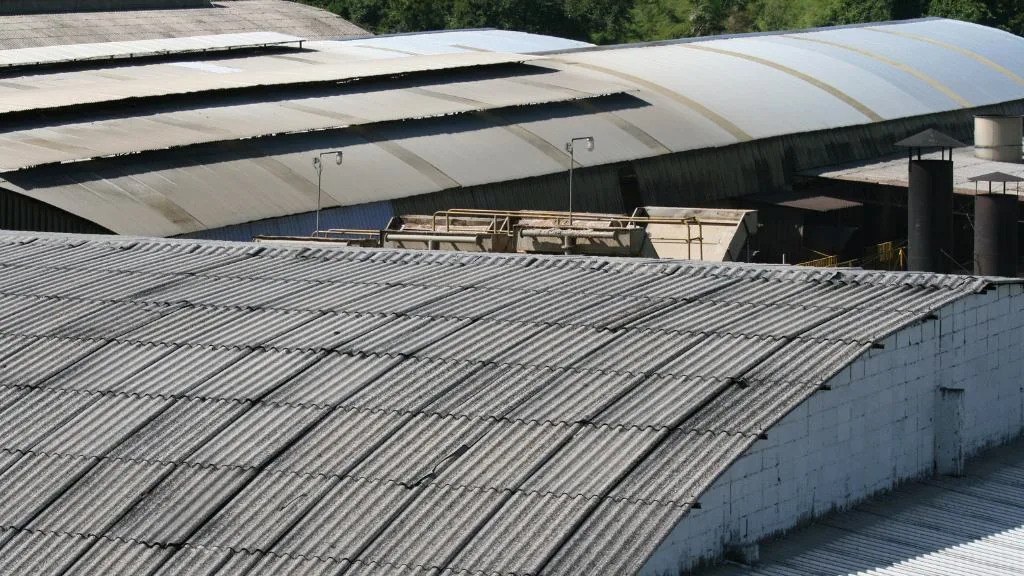
Industrial roofing is an essential aspect of any large-scale commercial or industrial facility. The roofing system must be strong enough to withstand harsh weather conditions and protect the building’s assets from damage. In this article, we’ll provide an overview of industrial roofing, including the different types of materials and their advantages and disadvantages. We’ll discuss the importance of regular maintenance and repairs to prolong the lifespan of the roof and avoid costly replacements. Whether you’re a facility manager, property owner, or contractor working in the industrial sector, our guide has got you covered. So, let’s dive in and learn more about industrial roofing!
What is Industrial Roofing?
Industrial roofing is a specialized type of roofing designed to provide insulation and protection for tall industrial and commercial buildings. It is typically flat, although pitched roofs with high ridges can be used where necessary.
Industrial roofs may also have parapets along the edges to prevent water from entering the building.
The primary purpose of industrial roofing is to protect the building and its contents from the elements, including rain, wind, snow, and sun. It also provides insulation to help regulate the temperature inside the building and reduce energy costs.
Industrial roofing is made from a variety of materials, including metal, asphalt, and single-ply membranes. Each material has its own advantages and disadvantages, and the choice of material will depend on factors such as the building’s location, climate, and budget.
Metal roofing is a popular choice for industrial buildings because it is durable, long-lasting, and can be customized to fit the building’s unique shape and size. Asphalt roofing is another option, although it is less durable than metal and may require more maintenance over time.
Single-ply membranes are a newer type of industrial roofing material that offer superior insulation and energy efficiency. They are typically made from synthetic materials such as PVC or TPO and are lightweight, flexible, and easy to install.
Overall, industrial roofing is an essential component of any industrial or commercial building, providing protection from the elements and helping to regulate temperature and energy costs.
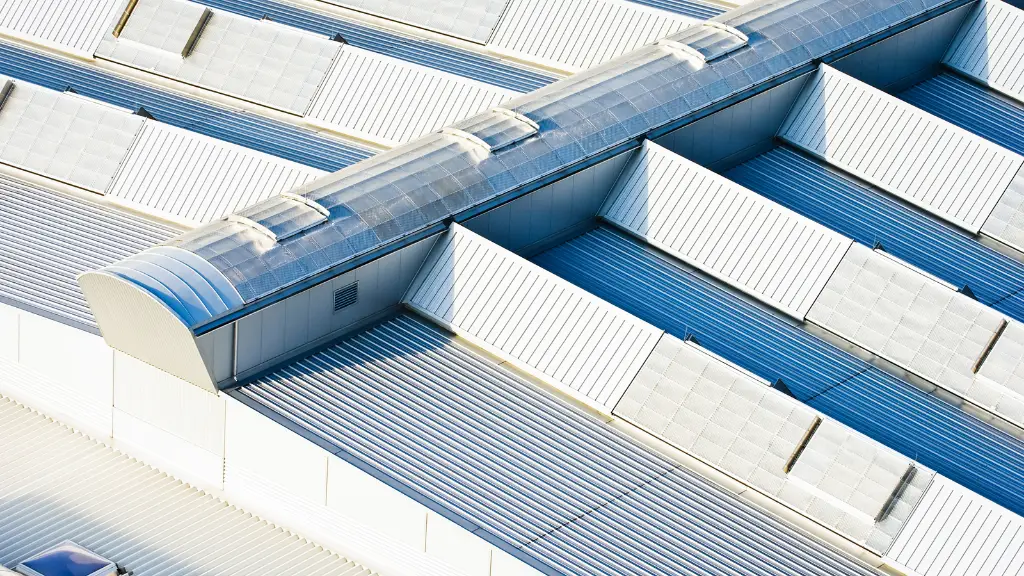
Types of Industrial Roofing Systems
When it comes to industrial roofing, there are several types of roofing systems to choose from. Each system has its own advantages and disadvantages, and it is important to choose the right one for your specific needs.
Here are the most common types of industrial roofing systems:
Built-Up Roofing System
Built-up roofing (BUR) is a traditional roofing system that has been used for many years. It is made up of several layers of reinforcing fabrics and roofing felts that are laminated together with bitumen.
The top layer is usually coated with gravel or a mineral surface to protect against weathering and UV rays. BUR systems are durable and can last up to 30 years with proper maintenance, but they can be heavy and require a strong roof structure to support them.
Thermoplastic Polyolefin (TPO) Roofing
TPO roofing is a popular choice for flat roofs in industrial and commercial buildings. It is made of a single-ply membrane that is heat-welded together to form a watertight seal.
TPO roofing is lightweight, energy-efficient, and can last up to 25 years with proper maintenance. It is also resistant to UV rays, chemicals, and punctures.
Ethylene Propylene Diene Monomer (EPDM) Roofing
EPDM roofing is another popular choice for flat roofs in industrial and commercial buildings. It is made of a synthetic rubber membrane that is glued or mechanically fastened to the roof deck.
EPDM roofing is lightweight, durable, and can last up to 30 years with proper maintenance. It is also resistant to UV rays, chemicals, and punctures.
Metal Roofing
Metal roofing is a durable and long-lasting option for industrial and commercial buildings. It can be made of corrugated galvanized steel, stainless steel, or other metals.
Metal roofing is lightweight, fire-resistant, and can last up to 50 years with proper maintenance. It is also energy-efficient and can be coated with reflective materials to reduce heat absorption.
In conclusion, when choosing an industrial roofing system, it is important to consider factors such as durability, energy efficiency, and maintenance requirements. BUR, TPO, EPDM, and metal roofing are all viable options depending on your specific needs and budget.
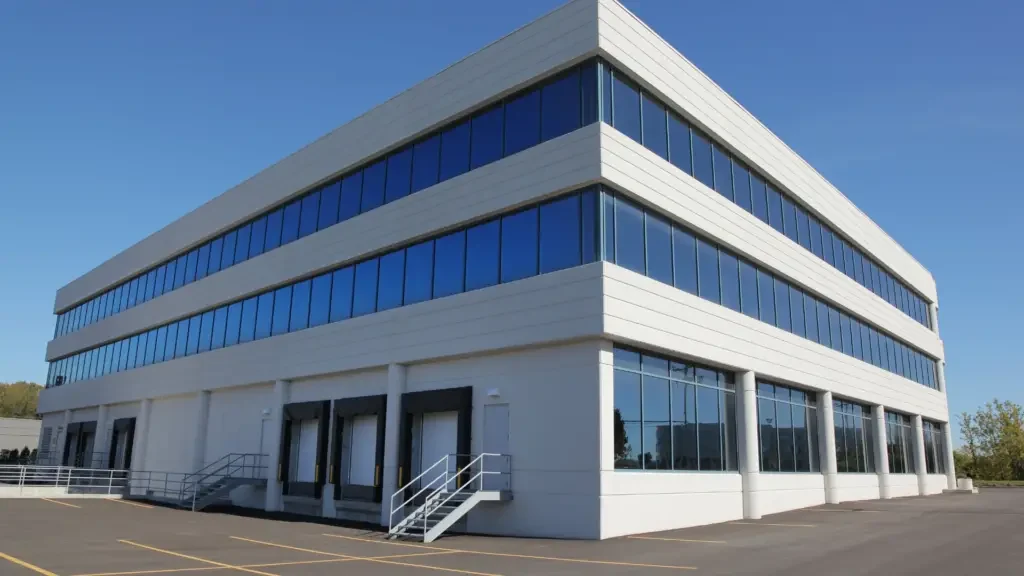
Materials Used in Industrial Roofing
When it comes to industrial roofing, there are several materials that can be used depending on the specific needs of the building. Here are some of the most common materials used in industrial roofing:
Asphalt Roofing
Asphalt roofing is a popular choice for industrial roofing due to its affordability and durability. It is made from a mixture of asphalt and fiberglass, which is then coated with granules for added protection.
Asphalt roofing is available in a range of colors and styles, making it a versatile option for industrial roofing projects.
Bitumen Roofing
Bitumen roofing is a type of roofing material that is made from asphalt and other materials. It is commonly used in industrial roofing due to its durability and resistance to weathering.
Bitumen roofing is available in a range of colors and styles, making it a versatile option for industrial roofing projects.
Modified Bitumen Roofing
Modified bitumen roofing is a type of roofing material that is made from asphalt and other materials. It is commonly used in industrial roofing due to its durability and resistance to weathering.
Modified bitumen roofing is available in a range of colors and styles, making it a versatile option for industrial roofing projects.
Copper Roofing
Copper roofing is a premium option for industrial roofing due to its durability and aesthetic appeal. It is resistant to corrosion and can last for over 100 years with proper maintenance.
Copper roofing is also an environmentally friendly option, as it is recyclable and can be reused.
Aluminum Roofing
Aluminum roofing is a lightweight and durable option for industrial roofing. It is resistant to corrosion and can last for over 50 years with proper maintenance.
Aluminum roofing is also an environmentally friendly option, as it is recyclable and can be reused.
Zinc Roofing
Zinc roofing is a premium option for industrial roofing due to its durability and aesthetic appeal. It is resistant to corrosion and can last for over 100 years with proper maintenance.
Zinc roofing is also an environmentally friendly option, as it is recyclable and can be reused.
In conclusion, there are several materials that can be used for industrial roofing, each with its own unique benefits and drawbacks. When choosing a material for your industrial roofing project, it is important to consider factors such as cost, durability, and aesthetic appeal.
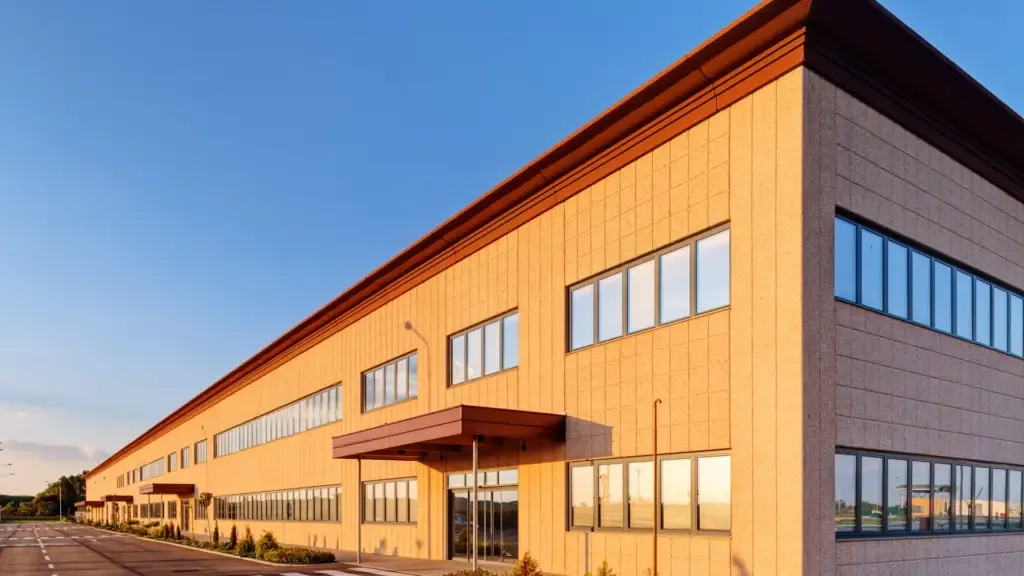
Common Industrial Roofing Problems
As a business owner or facility manager, it’s crucial to be aware of common industrial roofing problems. By being proactive and addressing issues early on, you can save yourself time, money, and headaches in the long run. Here are some common industrial roofing problems you should be aware of:
Leaks
Leaks are one of the most common industrial roofing problems. They can be caused by a variety of factors, including poor installation, moisture buildup, and damage from hail or wind.
Leaks can lead to water damage, mold growth, and even structural damage if left unaddressed.
To prevent leaks, it’s important to have your roof inspected regularly and to address any issues as soon as they arise. Maintaining your roof’s drainage system and ventilation can also help prevent moisture buildup that can lead to leaks.
Ice and Water Damage
Ice and water damage can be a major problem for industrial roofs, especially in areas with harsh winters. Water can seep into small cracks and freeze, causing the cracks to expand and leading to more serious damage over time.
To prevent ice and water damage, it’s important to maintain your roof’s drainage system and to ensure that your roof is properly insulated. Installing ice shields and using adhesives designed for cold weather can also help prevent damage from ice and water.
Rot and Deterioration
Rot and deterioration can occur in industrial roofs made from materials like wood or asphalt shingles. Moisture buildup can cause these materials to rot or deteriorate over time, leading to leaks and other problems.
To prevent rot and deterioration, it’s important to maintain your roof’s ventilation and to address any moisture buildup as soon as possible. Regular inspections can also help catch any issues before they become serious.
Hail and Wind Damage
Hail and wind can cause serious damage to industrial roofs, especially those made from vulnerable materials like tiles or panels. Hail can dent or crack roofing materials, while high winds can lift and tear them off.
To prevent hail and wind damage, it’s important to choose roofing materials that are designed to withstand these types of weather conditions. Regular inspections can also help catch any damage early on, allowing you to address it before it becomes a serious problem.
Fire Hazards
Industrial roofs can be a fire hazard if they’re not properly maintained. Debris buildup, damaged flashing, and other issues can all contribute to the risk of fire.
To prevent fire hazards, it’s important to maintain your roof’s flashing and to keep it free of debris. Regular inspections can also help catch any issues before they become serious.
Overall, by being aware of common industrial roofing problems and taking steps to prevent them, you can help ensure the longevity and energy efficiency of your roof, saving yourself time and money in the long run.
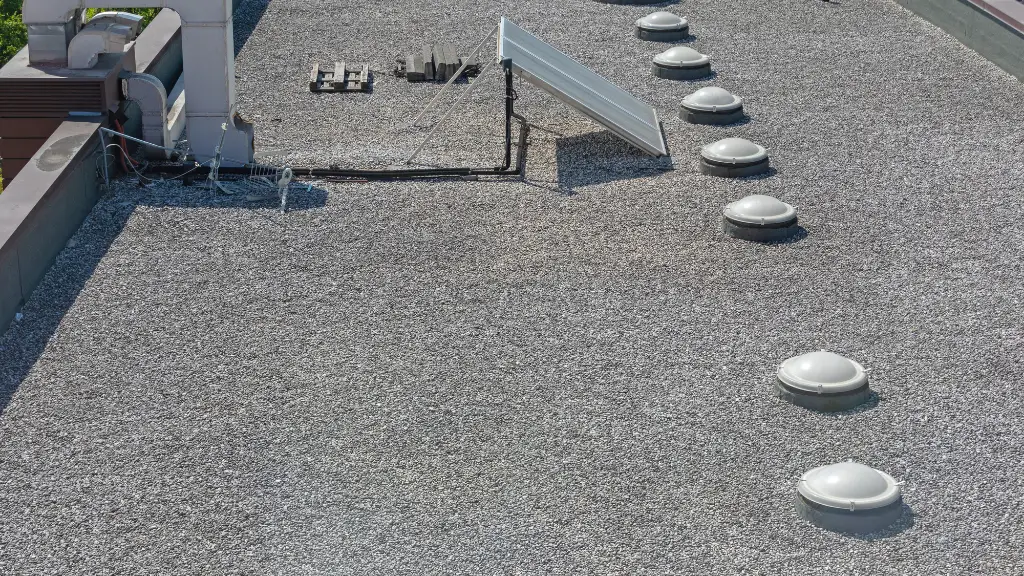
Industrial Roofing Maintenance and Repairs
Maintaining and repairing your industrial roofing is crucial to ensure the longevity and durability of the roof. Neglecting maintenance and repairs can lead to costly damages and potential safety hazards.
Here are some tips on how to properly maintain and repair your industrial roofing.
Maintenance
Regular maintenance is essential to prevent damages and prolong the lifespan of your industrial roofing. Here are some maintenance tasks you should perform:
- Inspect your roof regularly to identify any damages or potential issues.
- Clean your roof to remove debris, dirt, and other materials that could damage your roof.
- Check for leaks and repair them as soon as possible to prevent further damages.
- Trim trees and branches that could fall on your roof during severe weather conditions.
- Ensure proper drainage to prevent water from accumulating on your roof.
Repairs
When damages occur, it is essential to repair them promptly to prevent further damages and safety hazards. Here are some common repairs that may be necessary:
- Replace damaged or missing shingles or tiles to prevent water from penetrating your roofing system.
- Repair leaks and damages to flashing to prevent water from seeping into your building.
- Fix any punctures or tears in your roofing membrane to prevent water from entering your building.
- Repair any damages to your roof’s parapets to prevent water from entering your building.
- Repair or replace damaged gutters and downspouts to ensure proper drainage.
In conclusion, proper maintenance and repairs are essential to ensure the longevity and durability of your industrial roofing. By following these tips, you can prevent damages and safety hazards and prolong the lifespan of your roofing system.
Choosing the Right Industrial Roofing Contractor
When it comes to industrial roofing, choosing the right contractor is crucial. Here are some factors to consider to ensure you find the right contractor for your needs.
Training and Communication
One important factor to consider when choosing an industrial roofing contractor is their training and communication skills. A good contractor should be able to communicate with you effectively and provide you with all the necessary information about the project.
They should also have a team of well-trained professionals who are experienced in working on industrial roofs.
Equipment
Another important factor to consider is the equipment that the contractor uses. Industrial roofing requires heavy equipment, and it is important that the contractor has access to the right equipment for the job. This will ensure that the job is completed efficiently and safely.
Safety Measures
Safety is a top priority when it comes to industrial roofing. A good contractor should have safety measures in place to ensure that their workers are safe while working on your roof. This includes providing workers with the necessary safety equipment and ensuring that they are trained to use it properly.
In addition to these factors, it is also important to consider the contractor’s experience, reputation, and pricing. Do your research, ask for references, and compare quotes from different contractors to find the one that best suits your needs.
Overall, choosing the right industrial roofing contractor requires careful consideration of several factors. By taking the time to find the right contractor, you can ensure that your roof is properly supported and maintained for years to come.
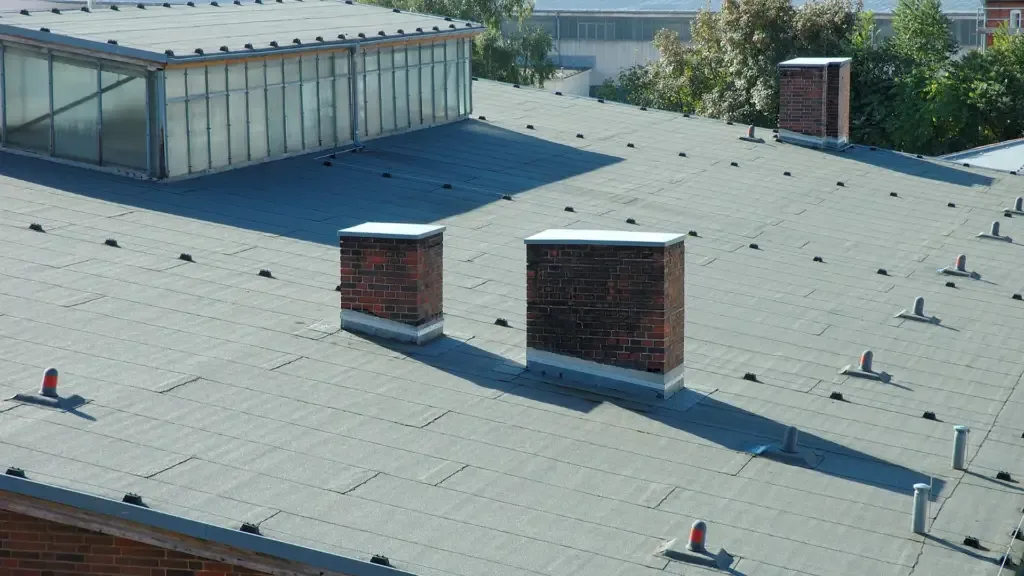
Conclusion
In summary, industrial roofing is an essential aspect of any commercial or industrial building. It is important to understand the different types of industrial roofing available, as well as the factors to consider when replacing an industrial roof.
One of the most significant advantages of industrial roofing is its ability to offer increased insulation, which can be up to four times more than traditional roofing.
This is particularly important for taller buildings, where insulation is crucial for maintaining a comfortable indoor temperature and reducing energy costs.
When replacing an industrial roof, there are several factors to consider, including the type of roofing material, the slope of the roof, and the cost of installation. Metal roofing is a popular choice for industrial buildings due to its energy efficiency, durability, and lightweight nature.
It is also important to consider the workforce challenges faced by the commercial roofing industry, including finding new workers and addressing COVID-19 health and safety concerns.
However, despite these challenges, the roofing industry has demonstrated resilience in the face of an ongoing pandemic and supply chain crisis.
Overall, industrial roofing plays a crucial role in protecting commercial and industrial buildings from natural hazards such as wind, rain, fire, hail, ice, snow, and extreme heat.
By understanding the different types of industrial roofing available and the factors to consider when replacing an industrial roof, you can make informed decisions to ensure the longevity and safety of your building.
